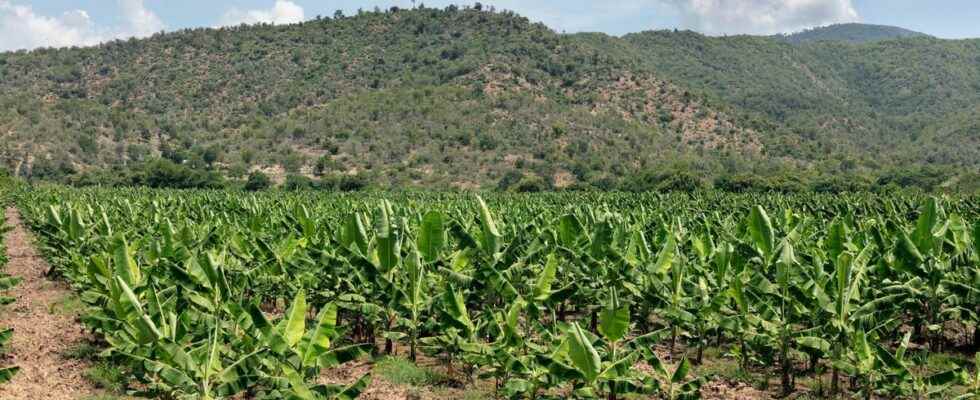Published ,
Reading 3 mins.
After sixteen years of investigations, the case could end with no indictment for poisoning with chlordecone of more than 90% of the population of the French West Indies. A possible decision of the Paris court which outrages the complaining communities and associations.
The investigating judges of the public health center of the Paris court ended the investigations of the investigation into the poisoning of the West Indies with chlordecone on March 25. According to sources close to the case, two investigating judges from the public health department of the Paris court have announced their intention to close this case without issuing an indictment. If proven, this decision could direct the trial towards a possible dismissal.
Chlordecone is an extremely toxic pesticide, widely used in banana fields in Martinique and Guadeloupe. Its adverse health effects have been recognized since the 1960s. It was banned in France in 1990 but continued to circulate in the West Indies until 1993.
A real health scandal
Chlordecone has contaminated all of the West Indian fauna and flora, but also its population. According to Public Health France (2018 report), more than 90% of the adult population in Guadeloupe and Martinique has been contaminated with chlordecone. The pesticide is at the origin of many cancers, in particular of the prostate.
“The French West Indies hold the sad world record for the annual incidence rate of prostate cancer”, declared Agnès Buzyn, Minister of Solidarity and Health in 2019, during a committee in the Senate.
In 2006, several West Indian associations filed a complaint for “poisoning, endangering the life of others and administering a harmful substance”.
Since 2008, the public health department of the Paris court has been responsible for the investigation. But in 2021, it was announced by the investigating judges that most of the facts were prescribed, since they dated from the 1990s.
After 15 years of procedures, chlordecone-related cancers had been recognized as “professional diseases” in a government decree of December 2021. It notably allowed infected farmers to be compensated.
Towards “a denial of justice”
The end of the investigations aroused revolt and anger among those who had been fighting for 16 years for an indictment of the French state in the chlordecone affair.
In a press release published on Tuesday, the lawyers of the association For an urban ecology, denounced the court’s decision:The turn taken by this scandalous case is worrying because we are moving towards a denial of justice”.
Harry Durimel, environmental mayor of Pointe-à-Pitre (Guadeloupe) and historical lawyer for the victims of chlordecone in the West Indies also expressed his anger on franceinfo, Wednesday April 6.
“Justice cannot leave such irresponsible facts unanswered“, he was indignant. “We consider that the facts are not prescribed since the intoxication, the massive poisoning that chlordecone causes in our soils, in our bodies and in our bones, is a continuous infraction”, added Harry Durimel.
The prosecution will soon have to reveal the orientation of its final indictment. Then will come the turn of the investigating judges. For the moment, the magistrates have announced to the complainant associations and communities their intention to close the file without pronouncing an indictment, thus directing it towards a dismissal.
Consult an oncologist online
“Prescription should no longer protect polluters”
New in the case of chlordecone in the West Indies. On Wednesday 27 April, the signatories of a online petition against polluters expressed their anger in a forum published by franceinfo. After learning of the decision of the Paris court which was moving towards a dismissal, some citizens took action. They denounce the French government’s inaction and refusal to investigate, resulting in the establishment of a “procedural guerrilla” .
When the package used the prescription argument – explaining that the facts were time-barred since they dated back to the 1990s – they denounced in their petition “a complacent investigation with the industrialists and the big banana families”.
Thus, they call on local elected officials, parliamentarians and the President of the Republic, “in view of the legislative elections” of June 2022, to “legislate without delay” for “that a reform of the limitation regime be adopted at the start of the next legislature”.
What is their request, concretely? Change the prescription regimen “in terms of environmental pollution”. Today, the law does not correspond to reality. The judicial use of prescription in soil, air or water pollution cases is inconsistent since its effects are known to be long-lasting.
“In the current state of the law, the starting point is fixed on the day of the pollution without it always being possible to determine with precision the exact date of its beginning. We believe, on the contrary, that the starting point of the prescription should be moved to the day when the pollution ceased. This would have the consequence of motivating the polluter to act as quickly as possible and not to let the evil spread”argue the signatories.
The fight has begun against the pesticide industry and the citizens of the West Indies are not ready to stop, demanding that “prescription no longer protects polluters”.
